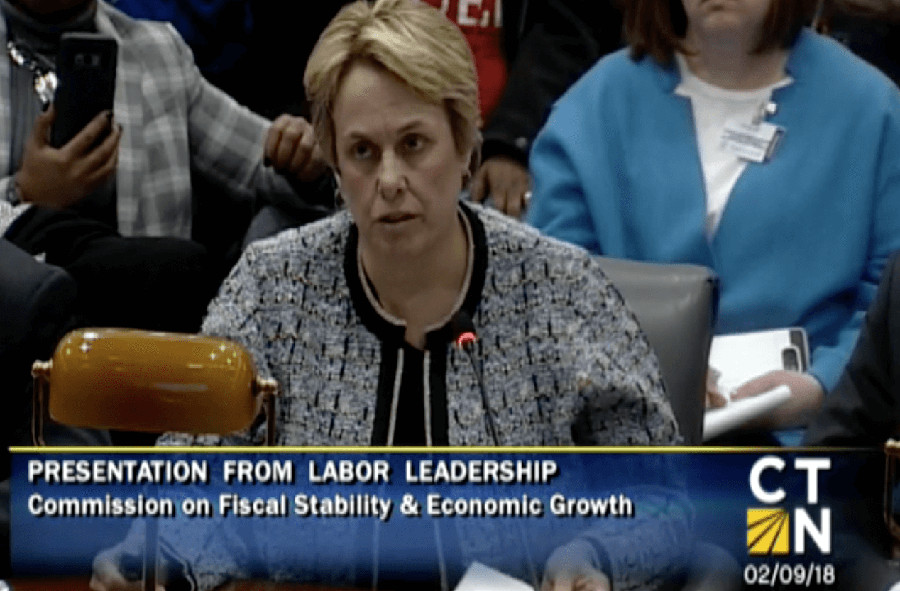Union organizers love wearing t-shirts, it’s their thing. When there is a bill up for debate in Connecticut which dares to address the massive cost of pensions, the T-shirt brigade will show up at the Capitol flying the purples and reds to scare lawmakers into tabling the issue.
And oh boy, if there’s a tax increase or another mandate on businesses up for debate, they’ll be there again to let those same lawmakers know how amazing they are for dreaming up such a scheme.

The T-shirts generally read something like “Union Power” or “Support Collective Bargaining,” or the name of a particular union.
But perhaps another T-shirt design would be more appropriate, particularly for Lori Pelletier, director of the Connecticut AFL-CIO — “Warning! Does Not Play Well With Others.”
It’s the kind of T-shirt that out-of-touch parents put on a problem child and think is funny, while other parents roll their eyes and quietly move their children to the other side of the room.
Last week Pelletier decided to lash out against the Commission on Fiscal Stability and Economic Growth with an op-ed in the Hartford Business Journal and some quotes in a CT Mirror story. According to her, the commission “attacks working people” because it is daring to discuss Connecticut’s financial problems and — gasp! — look at charts and graphs.
But it is impossible to discuss the issues facing Connecticut without addressing the multi-billion dollar gorilla in the room — namely the cost of pension liabilities, retiree benefits, and payroll for state employees.
According to Pelletier, looking at facts and trying to solve problems now constitutes an attack.
Pelletier and others love to point out that Connecticut underfunded pensions for decades. They don’t love to point out that union leaders had to agree to underfund those pensions. The state couldn’t do it unilaterally.
It wasn’t just politicians who sold state workers down the river, it was their union leadership, and now everybody — taxpayers and state employees — are having to pay the price.
Next, Pelletier claimed that “the fix is in” against labor.
How did she know? Well, there weren’t any labor representatives on the commission and union leaders hadn’t been invited to present their “ideas” to the panel.
How labor isn’t represented on the commission is a bit of a mystery. House Speaker Joe Aresimowicz, D-Berlin, is an employee of AFSCME and was able to appoint a commission member. So could a number of other union friends who work in House and Senate leadership.
As far as being invited, the CT Mirror story which carried Pelletier’s remarks pointed out the commission did not issue invitations to specific groups and “officials say any organization that approached the panel has been allowed to testify.”
Essentially, to testify before the panel, you need only to sign up. A few days after the story ran, Pelletier and her colleagues — including Aresimowicz’s boss, Sal Luciano — apparently got the message and added their name to the wait list. They testified a few days later and naturally called for increased taxes on businesses and the wealthy… again.

But it is precisely this mentality that has led Connecticut down its current fiscal path. Rather than recognizing and trying to address the fiscal problems threatening the state, union leadership would rather pretend it’s someone else’s fault, throw baseless accusations at a room full of individuals trying to help, and then push for more taxes as if the tax increases in 2011 and 2015 never happened.
Rather than working with businesses and business leaders — the very people Connecticut wants and needs to retain — Pelletier decides to launch a pre-emptive strike in the court of public opinion.
Why? Well, this is new territory for union leadership. They’ve never been challenged, never needed to make an argument based on merit or have a real debate. For decades, union leadership didn’t even have to worry whether or not a contract would be voted on before it was passed into law.
While business and industry leaders are constantly at the Capitol begging for leniency or penning op-eds asking lawmakers to reverse course, union leaders have been able to dictate the terms of when, or if, they were going to allow Connecticut to make any fiscal changes.
And if any proposals they didn’t like turned up in committee meetings, the T-shirt brigade would arrive at the Capitol carrying cardboard signs like they were pitchforks and torches. Or they just threatened to sue the state again (taxpayers are still paying for the last time SEBAC sued).
Even the union concession agreements of 2011 and 2017 were negotiated with a governor they helped elect and who was more than willing to extend their contract until 2027, tying the hands of future governors for the next 10 years.
Sure, the state employees may have to contribute a little more toward their pensions, but leadership got what they wanted — 10 more years holding the reins of power in the state Capitol.
But Connecticut finds itself between a rock and a hard-place and can no longer afford to just cater to government union demands, no matter how many T-shirts they have. Serious, long-term reforms will have to be made if the state hopes to survive.
Those who refuse to work with others on solving these issues may soon find themselves wearing a new kind of T-shirt and sitting by themselves at the lunch table, because both time and money has run out.

